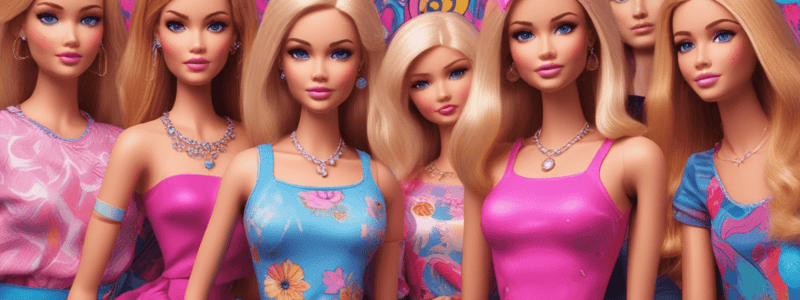Podcast
Questions and Answers
What was the primary intention behind the creation of the original Barbie doll in 1959?
What was the primary intention behind the creation of the original Barbie doll in 1959?
- To introduce a fashion-forward doll for girls
- To promote traditional maternal roles for young girls
- To celebrate the increasing diversity of women's roles in society
- To challenge the dominance of baby dolls in the toy market (correct)
Which of the following careers did early Barbie dolls represent?
Which of the following careers did early Barbie dolls represent?
- Engineer, lawyer, and politician
- Doctor, teacher, and businesswoman
- Scientist, athlete, and police officer
- Fashion model, nurse, and flight attendant (correct)
How did Barbie's representation evolve during the 1960s and 1970s?
How did Barbie's representation evolve during the 1960s and 1970s?
- Barbie's appearance was redesigned to appeal to a broader demographic
- Barbie adopted traditional domestic roles to align with societal values
- Barbie's body proportions were made more realistic to address criticisms
- Barbie took on diverse professional roles like doctor and astronaut (correct)
In response to criticisms about Barbie's lack of diversity, what changes did Mattel introduce in the 1980s and 1990s?
In response to criticisms about Barbie's lack of diversity, what changes did Mattel introduce in the 1980s and 1990s?
What impact did Barbie have on societal attitudes towards gender roles?
What impact did Barbie have on societal attitudes towards gender roles?
How did Barbie's role in pop culture contribute to her impact on society?
How did Barbie's role in pop culture contribute to her impact on society?
What is the primary purpose of the Inspiring Women Series featuring distinguished American women?
What is the primary purpose of the Inspiring Women Series featuring distinguished American women?
How has Barbie's evolution mirrored shifting societal values?
How has Barbie's evolution mirrored shifting societal values?
What is the central message conveyed about Barbie's story?
What is the central message conveyed about Barbie's story?
How has Barbie's role in pop culture evolved over time?
How has Barbie's role in pop culture evolved over time?
What is the primary impact that Barbie has had on generations of young girls?
What is the primary impact that Barbie has had on generations of young girls?
Flashcards are hidden until you start studying
Study Notes
Barbie: More Than Just a Toy
Evolution of Barbie's Image
The first Barbie doll made her debut in 1959. She was designed by Ruth Handler, the co-founder of Mattel, with the intention of challenging the traditional "baby doll" trend that dominated the toy market for young girls. Instead of emphasizing maternal care, Barbie was meant to present a more aspirational image for girls. Early Barbies held various professional roles, such as fashion model, fashion designer, registered nurse, flight attendant, and babysitter, showcasing a broader range of potential careers for girls beyond traditional gender roles.
History of Barbie Dolls
Barbie's journey over the years reflects societal changes and values. During the 1960s and 1970s, as women began entering the workforce and pursuing diverse careers, Barbie adopted occupations like doctor, astronaut, and pilot, inspiring young girls to dream big and consider a wider array of career possibilities. In response to criticisms about the doll's unrealistic body proportions and lack of diversity, Mattel introduced dolls with different ethnicities, skin tones, body types, and features during the 1980s and 1990s.
Impact of Barbie on Society
Barbie has had a profound impact on society, particularly in relation to changing attitudes towards gender roles and representation. She challenged conventional norms of motherhood and encouraged independence, self-fulfillment, and broadened aspirations for girls. The introduction of the Inspiring Women Series, featuring distinguished American women like Rosa Parks, Susan B. Anthony, Maya Angelou, Helen Keller, Eleanor Roosevelt, and Ida B. Wells, further highlights the role Barbies play in promoting positive social change.
Barbie's Role in Pop Culture
Beyond her status as a toy, Barbie has become a cultural icon. Her evolution mirrors shifting societal values, encouraging dreams, challenging gender norms, and fostering empowerment. From her early embodiment of beauty standards to subsequent efforts addressing body positivity and self-expression, Barbie continues to navigate identity, body image, and empowerment throughout history.
In conclusion, Barbie's story is not just about a plastic doll; it's about a reflection of changing societal attitudes and values. Through her evolution, she has inspired generations of young girls to aspire to greater heights, breaking barriers and defying convention.
Studying That Suits You
Use AI to generate personalized quizzes and flashcards to suit your learning preferences.




